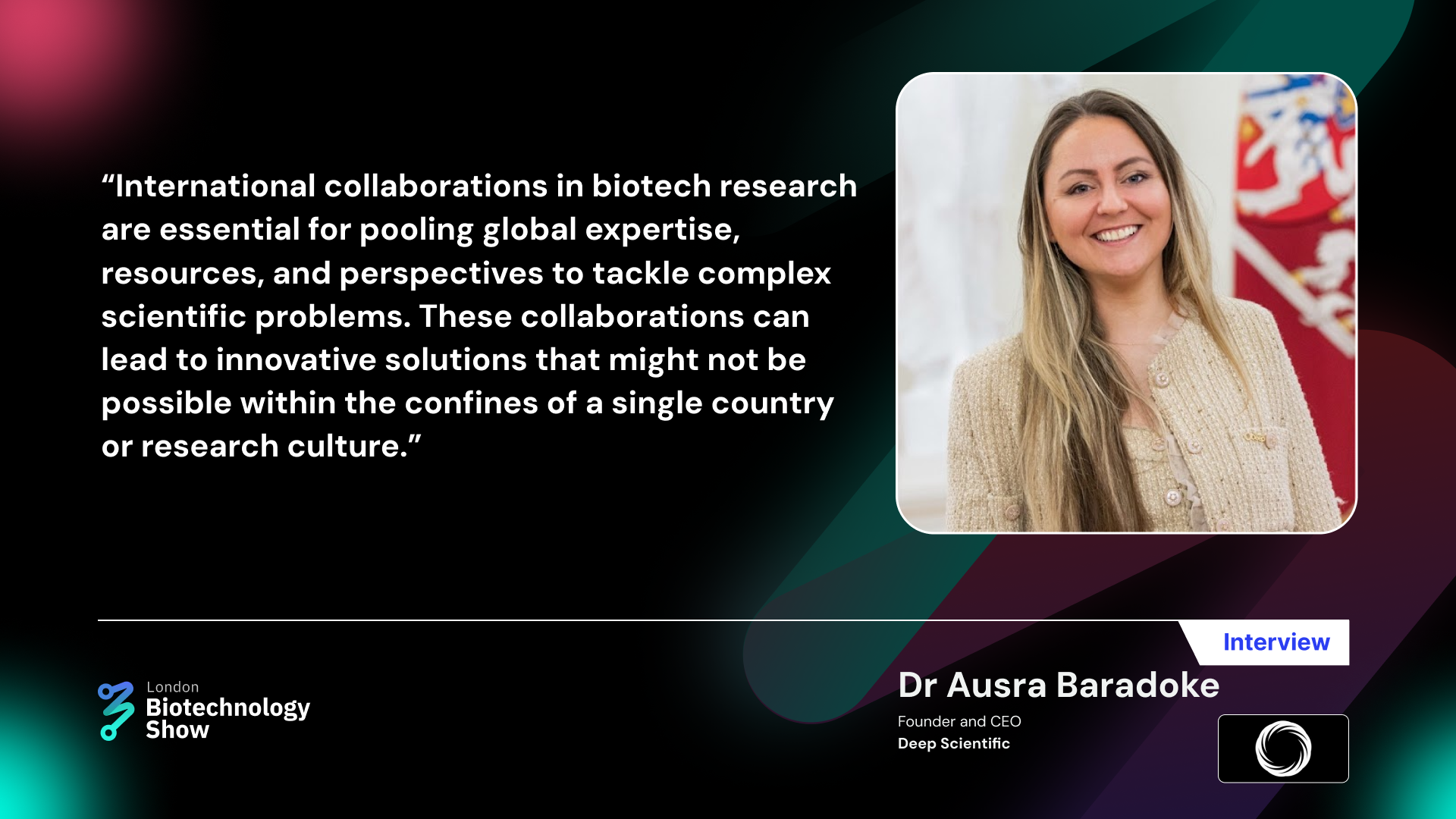In a recent interview, Dr Ausra Baradoke, the Founder and CEO of Deep Scientific, discussed with Muhammad Younis some pivotal subjects, including the groundbreaking potential of biosensors in disease detection and prevention, the role of nanomaterials in enhancing drug delivery systems, the integration of sustainability within biotech company operations and manufacturing, and the advantages stemming from international collaborations in biotech R&D. Dr Baradoke also shed light on her substantial contributions to the broader field.
#LBS: In what ways can biosensors revolutionize early disease detection and prevention in healthcare? What are some recent advancements in biosensor technology that have significantly impacted healthcare diagnostics?
Dr Baradokė: Biosensors are significantly transforming healthcare, particularly in early disease detection and prevention. Dr. Aušra Baradokė's contributions, including her work on polymer conductance in point-of-care diagnostics (Baradokė et al., 2020) and reagentless redox capacitive assaying of C-Reactive Protein (Baradokė et al., 2019), illustrate this. Additionally, her study on the environmental impact of biosensors (Baradokė et al., 2023) and her recent publication on the utilization of biosensors in environmental monitoring (Baradokė et al., 2023) highlight the expanding scope of biosensor applications. Wearable biosensors, offering non-invasive health monitoring, are becoming increasingly viable alternatives to traditional biomedical devices. The integration of innovative methodologies like CRISPR/Cas in biosensors has broadened diagnostic capabilities, a field where Baradokė’s research has made significant contributions.
#LBS: What are the key advantages of utilizing nanomaterials in drug delivery systems compared to traditional methods? What ethical considerations should be taken into account when implementing nanomaterials in biomedical applications?
Dr Baradokė: Nanomaterials in drug delivery systems offer targeted delivery and reduced side effects, as evidenced by Dr. Baradokė’s research group's work in this area. Her studies, including the recent one on biosensor environmental monitoring (Baradokė et al., 2023), provide insights into the ethical dimensions of nanomaterial use in biomedicine. These include evaluating long-term health and environmental impacts, balancing technological advancement with ethical responsibility.
#LBS: What are the primary challenges researchers face when transitioning from academia to the biotech industry? How can aspiring entrepreneurs navigate the complexities of both scientific innovation and business development in the biotech field?
Dr Baradokė: Transitioning from academia to the biotech industry is a significant shift for researchers. In academia, the focus is primarily on theoretical research and knowledge expansion, while the biotech industry emphasizes practical applications, product development, and profitability. For instance, in academia, Dr. Baradokė might have focused on fundamental research on biosensors, while in the biotech industry, the application of this research towards developing commercial products becomes a priority. This shift requires not just scientific expertise, but also business acumen, such as understanding market dynamics, managing finances, and securing funding for projects. Dr. Baradokė’s establishment of UAB "Deep Scientific" after her academic career, including her research on environmental monitoring (Baradokė et al., 2023a), is an example of successfully making this transition. Her journey can serve as a guide for aspiring biotech entrepreneurs, illustrating the need to balance scientific innovation with practical business development skills.
#LBS: What are some practical ways in which biotech companies can incorporate sustainability into their operations and manufacturing processes? What role do regulatory bodies and industry standards play in promoting sustainability within the biotech sector?
Dr Baradokė: Sustainability in the biotech industry involves adopting practices that not only advance scientific and medical progress but also do so in an environmentally responsible manner. This means minimizing waste, reducing energy consumption, and considering the long-term ecological impact of biotechnological products and processes. Dr. Baradokė’s research, particularly on the environmental aspects of biosensors (Baradokė et al., 2023) and their application in environmental monitoring (Baradokė et al., 2023), aligns with these sustainable practices. It reflects a commitment to not only advancing biotechnology but doing so in a way that is mindful of its ecological footprint. Regulatory bodies and industry standards support these efforts by setting guidelines and encouraging practices that reduce environmental harm, ensuring that biotech companies are not only innovators in science but also stewards of the environment.
#LBS: What are some practical ways in which biotech companies can incorporate sustainability into their operations and manufacturing processes? What role do regulatory bodies and industry standards play in promoting sustainability within the biotech sector?
Dr Baradokė: International collaborations in biotech research are essential for pooling global expertise, resources, and perspectives to tackle complex scientific problems. These collaborations can lead to innovative solutions that might not be possible within the confines of a single country or research culture. However, they also present unique challenges, such as navigating different regulatory standards, cultural differences in research approaches, and communication barriers. Dr. Baradokė's experience in international groups, including her work on environmental monitoring (Baradokė et al., 2023), demonstrates the value of such collaborations. By bringing together diverse expertise, international collaborations can accelerate scientific discovery and application. Effective communication, respect for different perspectives, and a clear understanding of shared goals are key to overcoming the challenges and harnessing the potential of international research partnerships.
#LBS: The London Biotechnology Show 2024 aims to discuss and debate biotech solutions? What is your opinion about events like these?
Dr Baradokė: Events like the London Biotechnology Show 2024 offer platforms for networking and innovation showcasing. Dr. Baradokė’s engagement with the international scientific community, as reflected in her studies on biosensors and environmental monitoring (Baradokė et al., 2023; Baradokė et al., 2023), aligns with the vision of these events, promoting global collaboration and innovative solutions in biotechnology.


